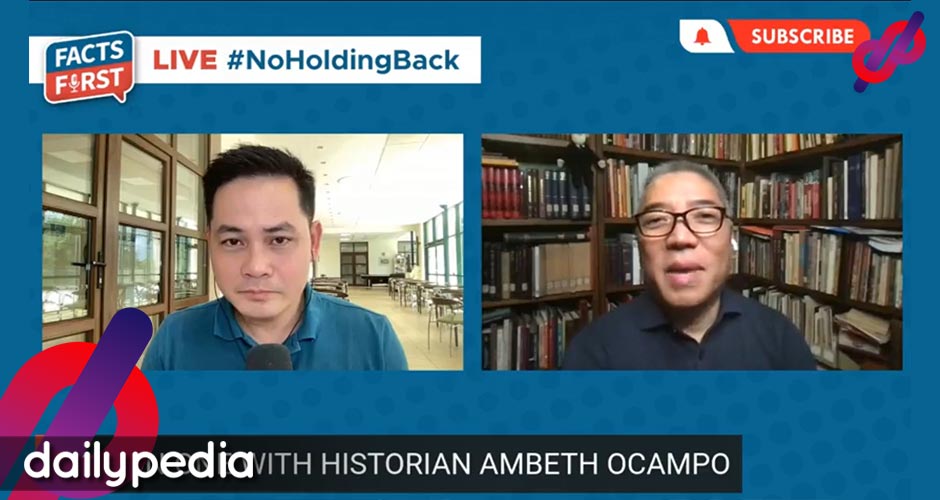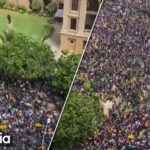The renowned historian underscored battle trolls with truth to preserve the sanctity of history and facts.

Filipino historian Ambeth Ocampo could not help but express his frustration and disappointment over the aggressive and caustic insults he received, following his stand on the ongoing efforts to revise certain parts of our democratic history.
The Philippine Daily inquirer columnist talked to the former ABS-CBN journalist in his podcast Web show, Facts First PH.
Ocampo is notably among the first local historians to comment about the viral statement of actress Ella Cruz, who is playing one of the roles in the upcoming Viva Films movie, Maid in Malacañang. The movie is directed by content creator, Darryl Yap, who has been front and center of several controversies in showbiz, lately. The film he is directing caught the attention of netizens, as well as, historians, as it will tackle the last 72 hours of the ousted Marcos family at the Malacañang in 1986. Historical distortion concerns were raised, as soon as the project was first announced.
However, the response from the local community of historians has never been as clear and forward, as when Ella Cruz described ‘history’ as ‘chismis’ or hearsay. The statement also earned the ire of many netizens who schooled the former Kapamilya actress and star of the hit teleserye, Aryana (2012), about the history and the historians who helped establish the truths in our centuries-long history.
Asked what he’s been feeling about the trolling and slurs he received, Ocampo did not hide his struggle in accepting the behavior of his bashers.
“I think madaling sabihin na okay ako, pero alam mo pag-binasa mo iyong mga comments nitong mga troll, talagang bastos.
(It’s easy to say I am okay, but you know what…if you read what these trolls are saying about me, you can tell they are really rabid),” he said, as he also gave examples of the disparaging comments thrown at him by online trolls.
“It is so vicious na, you can not help but get affected ‘di ba? Pero ‘yun ang trabaho, kasama ‘yan (But that’s the job, it is part of my work)” he added.
While he noted that he had come across trolls before, Ocampo expressed his surprise in finding a new kind of blatancy and viciousness of trolls, online. “I have never seen this kind of discourse” he explained.
Ocampo remembered that it all began when he commented on Cruz’s viral statement
“Sinabi niya na ang history ay parang chismis lang daw; sinagot ko lang nang don’t confuse history wih chismis, because history is about facts. History is not opinion.
(She said that history is like hearsay; I just opposed it. I said ‘don’t confuse history with facts, because history is about facts, not opinions)”he said.
“Lies are never respected; they are not endured. You have to call them out and you have to correct them. I corrected them in a very gentle manner, tapos nakita ko grabe…I mean, what trackes have shown is that, it’s not organic,” Ocampo shared, suggested that his bashers are coming from an organized source—a troll farm, in other words.
Ocampo underscored the need to address the impending dangers of disinformation and persistent efforts to revise or even erase some established truths in our story as a nation. He drew parallels between the Catholic practice of exorcism to drive away demons, and efforts to preserve historical data by getting rid of lies.
“When you think about it, I just realized now, the Catholic rites of exorcism. Kapag paaalisin mo, hindi mo kayang alisin ang demonyo kung hindi mo alam ang pangalan. So the exorcist will always ask, ‘what is your name?’..kasi kapag nakuha mo ‘raw ‘yung pangalan, it gives you power over it,” he said.
The Filipino historian insisted that lies must be first identified before one can fully remove them from the fabrics of history.
“It is a demon that must be called by its proper name, in order to be exorcised,” he added.
According to Ocampo, an example of those lies, which he called demons, are found in Marcos’s diaries.
“I see that he is lying to his own diaries, because he knows that history is based on written records” he emphasized.
He also added that Marcos wrote his diaries so that the future generation can see him as an ideal man, worthy of their admiration.
“Ito ay hindi niya sinulat para sa panahon na ‘yon. It was to be read in the future”.
Ocampo argued the necessity of waging the war against historical revisionism and disinformation right at the platforms where they are being made to thrive.
“Sabi ko, hindi ko na kayo aawayin (I said I will no longer fight you). I will just do what I have been doing for the last 30 years, but the difference now is that I will engage you in your platform,” he shared.
“It gives us a voice in that platform. Hindi natin pinabayaan.”
He also emphasized turning social media platforms such as Twitter, Facebook, and TikTok, into tools to combat lies, the same way they are being utilized by other people to spread misinformation.
“Kung kaya nilang gamitin sa kagaguhan, puwede din natin gamitin sa katotohanan (If they can use it in doing nasty things, we can also use it to propagate truths,” he said.
Asked if the Philippines has been losing its fight to defend facts, Ocampo agreed that so far, we are.
“That’s why we have to do something. That’s why we have to push back”.
He also gave importance to untangling half-truths, as they are harder to defeat the complete lies. He invited members of the Academe and fellow historians to join in the battle against revisionism, and his aspiration to flip social media as an instrument to protecting history and propagating truths.
In the end, Ocampo highlighted the role of education in our collective battle against historical distortion and disinformation.
Ocampo both raised his concern and expressed his optimism about the future of the preservation of history and facts in the country, now that the Marcoses have returned to power.
“Well, they can give us their version of history, but history is long. History is longer than us,” he said.
He shared that while history can be bent, it will always align itself with the truth at some point.
“Maari ninyong baluktutin ngayon, pero pag wala na kayo., babalik din tayo sa katotohanan (You can modify it today, but once you have left power, it will always come back to the truth)” he said, expressing his hopefulness.
“Truth will always be there. It can be sidelined. It can be silenced for a while, but it will always comes out. Hindi mo ‘yan mahihinto; lalabas at lalabas yan,” he warned.
Ambeth Ocampo is a Filipino author who wrote dozens of books on history, culture, and many more non-fictional publications.
He is currently a professor of history at the Ateneo de Manila University. During the interview with Esguerra, the Filipino historian shared that he is planning to strengthen his social media presence by translating what he has already written into more accessible digital forms.


